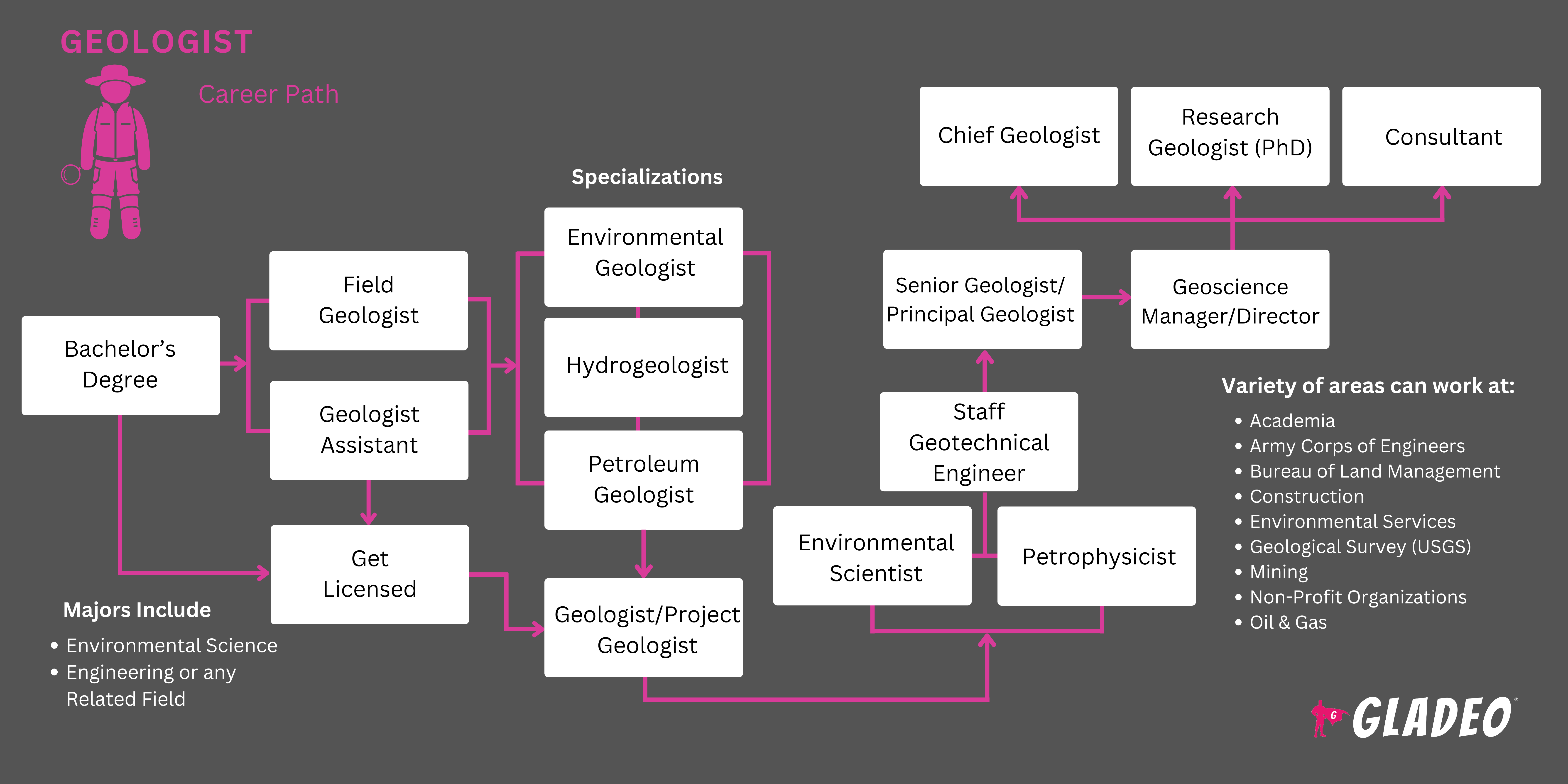스포트라이트
공학 지질학자, 환경 보호 지질학자, 탐사 지질학자, 지질학 전문가, 지질학자, 지구 물리학자, 지구 과학자, 수문 지질학자, 광산 지질학자, 프로젝트 지질학자
우리 대부분은 우리가 살고 있는 거대한 바위에 대해 생각하며 앉아 있지 않습니다. 우리는 시속 1,000마일로 지구가 회전하는 동시에 시속 67,000마일로 태양 주위를 공전하는 동안 그저 생업에 종사할 뿐입니다!
하지만 지구는 이것만이 전부가 아닙니다. 지표면에서는 거대한 지각판이 움직이며 지진과 화산 활동을 일으키고 있습니다. 지표면과 행성의 핵 사이에는 지구의 맨틀 안에서 녹은 암석이 끊임없이 흐르고 있습니다. 한편, 핵의 바깥쪽은 액체 금속의 움직임을 통해 거대한 자기장을 생성합니다.
이 모든 것들은 지형을 바꾸고, 산을 만들고, 수백만 년 동안 지구를 형성해 온 강력한 힘을 움직이는 등 지구의 물리적 구조에 영향을 미칩니다. 우리는 이곳에 살고 있기 때문에 지구에 일어나는 모든 일이 우리에게 영향을 미치기 때문에 무슨 일이 일어나고 있는지 이해해야 합니다. 이것이 바로 지질학자가 필요한 이유입니다!
지질학자들은 샘플을 수집하고, 실험실 테스트를 실행하고, 현장 매핑, 원격 감지 및 지리 정보 시스템을 통해 얻은 데이터를 해석하여 이러한 복잡한 과정을 연구합니다. 또한 과거의 사건을 연구하여 미래의 사건을 예측하기도 합니다.
우리가 이들에 대해 많이 듣지는 못하지만, 그들의 작업은 환경 보존, 중요한 자원 추출 및 자연 재해 대비에 매우 중요합니다!
지질학자를 위한 다양한 전문화 옵션이 있으며, 여기에는 다음을 포함하되 이에 국한되지 않습니다:
- 엔지니어링 지질학자 - 건설 및 인프라 같은 엔지니어링 프로젝트에 지질학적 원리를 적용합니다.
- 환경 지질학자 - 환경 보호 및 개선 노력에 중점을 둡니다.
- 지구화학자 - 지구 내의 암석, 광물, 유체의 화학 성분을 연구합니다.
- 지형학자 - 지형과 지구 표면을 형성하는 과정을 분석합니다.
- 빙하학자 - 빙하와 얼음 관련 과정을 연구합니다.
- 수문 지질학자 - 지하수 시스템과 수자원을 연구합니다.
- 해양 지질학자 - 해양 및 해안 지질학에 중점을 둡니다.
- 광업 지질학자 - 지구에서 광물과 자원을 추출하는 데 관여합니다.
- 고생물학자 - 화석과 고대 생명체를 전문적으로 연구합니다.
- 석유 지질학자 - 석유 및 가스 자원의 위치 파악과 추출을 전문으로 합니다.
- 행성 지질학자 - 행성과 달과 같은 천체의 지질학을 연구합니다.
- 퇴적학자 - 퇴적 과정과 퇴적암을 전문으로 연구합니다.
- 지진학자 - 지진과 지각판의 움직임을 연구합니다.
- 화산학자 - 화산과 관련 현상을 연구하는 데 중점을 둡니다.
- 지구의 지질학적 과정과 역사에 대한 탐구와 이해
- 자원 관리 및 환경 보호에 기여
- 여행 및 야외 근무의 기회
- 과학 및 산업 분야의 다양한 팀과의 협업
근무 일정
지질학자는 일반적으로 풀타임으로 일하며, 불규칙한 근무 시간과 출장이 포함될 수 있는 중요한 현장 작업을 수행하는 경우가 많습니다. 사무실, 실험실 또는 다양한 현장 위치에서 근무할 수 있습니다.
일반적인 의무
- 샘플 수집 및 테스트 프로그램을 포함한 현장 연구를 수행하기 위해 장소를 방문합니다.
- 토양, 암석, 화석을 조사하여 지각의 구성, 구조, 역사를 조사해 보세요.
- 전문 소프트웨어를 사용하여 지질학 데이터를 분석하고 해석합니다.
- 유정 기록, 시추공, 항공 사진에서 지구물리학적 정보를 해석합니다.
- 지진계와 자력계를 사용하여 지구의 특성을 측정하세요.
- 지진이나 화산 폭발과 같은 자연재해의 위험을 파악하세요.
- 지하수 및 지표수 이동을 평가하여 폐기물 관리 및 부지 복구에 대한 조언을 제공합니다.
- 천연가스, 석유, 광물 또는 지하수의 매장지를 찾아보세요.
- 지질도, 단면도, 자원 관리 보고서를 준비합니다.
- 지역 개발 및 공공 사업을 지원하기 위한 연구를 수행합니다.
- 연구 논문과 프레젠테이션을 통해 연구 결과를 전달하세요.
추가 업무
- 토양 또는 지하수 오염 완화를 위한 계획을 평가합니다.
- 건설 현장을 검사하세요. 지질학 및 엔지니어링 문제를 분석합니다.
- 핵폐기물 관리 및 원자로 입지에 대한 조언을 제공하세요.
- 광산 구조의 무결성을 모니터링하고 지질학적 광산 지도를 설계하세요.
- 환경 및 기술 보고서의 정확성과 관련성을 검토합니다.
- 기기를 사용하여 암석 및 토양과 같은 지질학적 재료를 테스트합니다.
- 토지 개간 및 자원 추출 방법을 개발하세요.
- 건설 회사에 토지 사용, 기초 설계 및 자원 관리에 대한 자문을 제공합니다.
- 건축 회사
- 대학 및 대학
- 엔지니어링 회사
- 환경 컨설팅 회사
- 지방 정부 기관
- 채굴 회사
- 석유 및 가스 회사
- 연구 기관
- 주 및 연방 정부 및 군 기관
- 과학 기관
지질학자는 세심한 연구와 데이터 수집을 수행해야 하므로 정확성과 비판적 사고가 필요합니다. 잘못된 해석은 심각한 결과를 초래하는 잘못된 결정으로 이어질 수 있기 때문에 정확성이 필수적입니다. 자연재해 예측, 자원 관리, 환경 계획과 같은 문제에서 특히 그렇습니다.
현장 조사는 지질학자의 업무에서 큰 부분을 차지하며, 종종 사막, 산악, 해양 등 험난하고 외진 곳이나 위험한 장소에서 이루어집니다. 이러한 작업에는 체력, 적응력, 열악한 환경을 장기간 견뎌낼 수 있는 의지가 필요합니다. 또한 몇 주 동안 집을 비우게 되면 일과 삶의 균형에 영향을 미칠 수 있습니다.
원격 탐사, 지리 정보 시스템, 컴퓨터 기반 모델링의 혁신으로 정밀도와 대규모 연구 프로젝트 관리 능력이 향상되는 등 기술 발전이 지질학을 재편하고 있습니다.
지속 가능성 또한 주요 초점입니다. 지질학자는 채굴 및 석유 시추와 같은 자원 추출이 환경에 미치는 영향을 평가하는 데 필수적입니다. 책임감 있는 토지 사용, 오염 통제, 생태계 복원을 통해 생태 발자국을 줄이려는 움직임이 점점 더 커지고 있습니다. 이로 인해 자원 탐사 및 추출을 위한 보다 친환경적인 방법이 개발되고 있습니다.
또한 지질학자들은 석탄과 석유에 대한 보다 지속 가능한 대안을 제공하는 지열, 태양열, 풍력과 같은 재생 에너지원으로의 전환에 점점 더 많이 관여하고 있습니다.
지질학자는 자연 세계에 대한 호기심이 많고 하이킹이나 암석 채취와 같은 야외 활동을 즐기는 경우가 많습니다. 자연 과학과 지리학에 관심이 많고 직접 체험하는 학습 경험을 즐겼을 수도 있습니다.
- 지질학자는 일반적으로 지질학 학사 학위가 필요합니다. 다른 전공으로는 지구과학, 천연자원 또는 관련 분야가 있습니다.
- 프로그램에서 실무 능력을 키울 수 있는 현장 실습 기회를 제공한다면 도움이 됩니다.
- 특히 연구나 학계에서 일하는 고급 직무의 경우 석사 또는 박사 학위가 필요할 수 있습니다.
- 관련 강좌에는 다음이 포함될 수 있습니다:
- 환경 지질학
- 필드 메서드
- 지화학
- 지질 매핑
- 지구물리학
- 수문 지질학
- 광물학
- 고생물학
- 퇴적학
- 구조 지질학
- 전문 직무는 해당 분야와 관련된 과정과 교육이 필요합니다. 예를 들어 채굴 지질학자는 다음과 같은 수업을 들어야 할 수 있습니다:
- 드릴링 및 샘플링 기술
- 탐사 지구물리학
- 광산 안전 및 위험 관리
- 광석 매장 지질학
- 석유학
- 광업 분야의 원격 감지 및 GIS 애플리케이션
- 실무 교육과 인턴십은 실무 경험을 쌓는 데 매우 중요합니다.
- 다음과 같은 인증이 도움이 되는 경우가 많습니다:
- 미국 석유 지질학자 협회 - 공인 석탄 지질학자 또는 공인 석유 지질학자
- 미국 전문 지질학자 협회 - 전문 지질학자
- 환경 시스템 연구소 - ArcGIS 엔터프라이즈 관리 전문가
- 국가 환경 전문가 등록 - 등록 환경 전문가
- 또한 지질학자는 일반적으로 미국 지질학 협회(ASBOG)의 시험을 통과해야 면허를 취득(또는 유지)할 수 있습니다.
- 첫 번째는 지질학 기초(FG) 시험으로, 지질학 원리를 다룹니다.
- 다음은 실무 경험을 쌓은 후 응시하는 지질학 실습(PG) 시험입니다. 이 시험에서는 고급 지질학 기술과 실무 지식을 다룹니다.
- 교육 및 경력 요건을 충족했다면 이제 면허 위원회를 통해 전문 지질학자(PG) 면허를 신청할 차례입니다!
- 주별 요구 사항이 있을 수 있으므로 자신의 전문 분야에 따라 근무하려는 지역의 규정을 확인하세요.
- 지질학자는 면허를 갱신하기 위해 지속적인 추가 교육을 이수해야 할 수도 있습니다.
- 지질학 동아리가 있는 학교나 지역 산업체 또는 정부 기관과 연계된 학교를 찾아보세요.
- 현장 학습 경험을 제공하고 최신 시설과 도구를 갖춘 프로그램을 찾아보세요.
- STEM 관련 대학 프로그램은 ABET의 인증을 받아야 한다는 점을 기억하세요.
- 학비, 할인, 지역 장학금 기회(연방 지원금 외에)를 고려하세요.
- 졸업률 및 졸업 후 취업 통계를 검토합니다.
- 캠퍼스 내 프로그램, 온라인 프로그램 또는 하이브리드 프로그램에 등록할지 결정할 때는 자신의 일정과 유연성을 고려하세요.
유에스 뉴스의 지질학 전공을 제공하는 대학에서 검색을 시작해보세요! 지질학자 지망생은 자신이 원하는 전공 분야와 관련된 과정을 제공하는 프로그램을 찾아야 합니다.
- 고급 배치 수업을 포함한 지구 과학, 화학, 물리학, 수학, 통계 및 환경 연구 강좌에 등록하세요.
- 팀워크, 리더십, 프로젝트 관리와 관련된 지질학 클럽, 과학 박람회, 과외 활동에 참여하세요.
- 지질학, 환경 과학 또는 관련 분야의 인턴십, 아르바이트, 자원봉사, 협동 교육 프로그램을 통해 실무 경험을 쌓을 수 있습니다.
- 현장 조사, 지질 조사, 매핑, 데이터 분석 및 연구 프로젝트의 포트폴리오를 구축하세요.
- 최신 지질학 도구, 소프트웨어 및 발전된 기능에 대한 최신 정보를 확인하세요.
- 지질학 소프트웨어, 지리 정보 시스템, 컴퓨터 도구, 실험실 및 현장 기술을 능숙하게 사용할 수 있습니다.
- 과학 논문, 책, 기사를 읽어보세요. 교육용 동영상을 시청하여 업계 동향에 대한 최신 정보를 얻으세요.
- 정보 제공 인터뷰 또는 직무 섀도잉 기회를 요청하여 커리어에 대한 인사이트를 얻으세요.
- 이벤트에 참석하고 온라인 포럼에 참여하여 전문가들과 네트워크를 형성하세요.
- 미국 지질학회 또는 미국 지구과학연구소와 같은 전문 단체에 가입하세요.
- 추천인 역할을 하거나 경력 조언을 제공할 수 있는 교수, 멘토, 동료 등의 연락처를 추적하세요.

- 인디드닷컴, 링크드인, 글래스도어, 몬스터, 커리어빌더, 심플리히어드, 집리크루터, USAJOBS 등의 취업 포털과 정부 기관을 포함한 현지 고용주 웹사이트도 확인해 보세요.
- 초급 직책을 수락하여 경험을 쌓은 후 승급할 수 있도록 준비하세요.
- 인턴십, 수습직 또는 신입 사원으로 경험을 쌓을 수 있는 기회를 찾아보세요.
- 채용 공고에서 다음과 같은 중요한 키워드를 메모해 두세요:
- 데이터 분석
- 환경 평가
- 필드 매핑
- 지리 정보 시스템(GIS)
- 지질 조사
- 광물 탐사
- 원격 감지
- 지진 해석
- 토양 샘플링
- 지층학
- 지질학자 이력서 예시와 일반적인 지질학자 면접 질문을 확인하세요.
- 전문가 네트워크의 모든 사람에게 구직 중이라고 알리세요!
- 경력 있는 지질학자에게 구직 전략에 대한 조언을 구하세요.
- 이력서 지원 및 구직 지원을 받으려면 학교의 커리어 센터를 활용하세요.
- 대학 교수, 전 상사, 동료에게 개인적인 추천인 역할을 해줄 수 있는지 물어보세요. 하지만 이들의 연락처 정보를 함부로 알려주면 안 됩니다.
- 여러 번의 모의 면접을 통해 실제 면접에 대비하고 긴장을 풀 수 있도록 연습하세요.
- 면접에 적합한 복장을 갖추세요.
- 지질학에 대한 열정과 자원 채굴이나 보존과 같이 전문적으로 다루고 싶은 분야에 대한 열정을 보여주세요!
해당 분야와 관련된 용어와 최신 이슈에 대해 공부하세요.
- 경력 개발에 대해 상사와 상의하세요.
- 석사 학위나 미국 전문 지질학자 협회의 전문 지질학자 등의 자격증을 취득하는 등 추가 교육을 받습니다. 수문 지질학, 지구물리학 또는 환경 지질학과 같은 틈새 분야를 전문으로 하는 것도 고려해 보세요.
- 고품질의 결과물을 적시에 제공함으로써 현재 역할에 탁월합니다.
- 특히 지리공간 도구와 데이터 분석 분야의 새로운 기술과 업계 발전에 대한 최신 소식을 받아보세요.
- 복잡한 현장 조사 프로젝트에 도전하여 경험을 다양화하세요.
- ArcGIS, MATLAB 또는 Python과 같이 지질학에 사용되는 소프트웨어를 배우고 익힙니다.
- 영향력 있는 저널에 연구 논문을 게재하여 신뢰도를 높이고 전문성을 보여주세요.
- 미국 지질학회와 같은 전문 단체에 적극적으로 참여하세요.
- 컨퍼런스에서 발표하고, 워크숍에서 다른 사람들을 교육하고, 업계 전문가들과 네트워크를 형성하세요.
- 후배 지질학자를 멘토링하고 작업에서 얻은 인사이트를 공유하세요.
- 채용 공고가 많은 지역으로 이사하는 것을 고려하세요. 지질학자의 고용률이 가장 높은 주는 캘리포니아, 텍사스, 콜로라도, 워싱턴, 오클라호마주입니다.
- 사내 기회를 추적하고 경력 목표에 맞는 직무에 지원하세요.
- 규제 기관과 강력한 관계를 구축하세요.
웹사이트
- 추가 쐐기
- AGU 블로고스피어
- 미국 지구과학 연구소
- 환경 및 공학 지질학자 협회
- 지구 과학 정보 파트너
- 환경 및 엔지니어링 지구물리학회
- 유럽 지구과학 연합
- 미국 지질 학회
- 글로벌 개발을 위한 지질학
- 지질학 분야
- 지오사이언스월드
- 지오트리퍼
- 높은 알로크톤성
- 국제 지구윤리 협회
- 국제 수문 지질학자 협회
- 미국 광물학 협회
- 전국 지하수 협회
- OneGeology
- 광업, 야금 및 탐사 학회
- 미국 지질 조사국
책
- 지질학의 필수 요소, 스티븐 마샤크 저
- 초보자를 위한 지질학, 알레시아 M. 스푸너 저
- 지질학 입문자를 위한 실험실 매뉴얼, 앨런 러드먼과 스티븐 마샤크 저
- 지질학의 원리, 찰스 라이엘 저
지질학은 다양한 전공 옵션이 있는 매력적인 직업이 될 수 있습니다. 하지만 이 분야가 적성에 맞지 않는다면 다음과 같은 다른 옵션을 고려해 보세요:
- 인류학자
- 천문학자
- 대기 과학자
- 생물학자
- 토목 엔지니어
- 보존 과학자
- 데이터 과학자
- 환경 과학자
- 지리학자
- 지리 정보 시스템 전문가
- 지질 공학자
- 수문학자
- 산업 생태학자
- 마이닝 엔지니어
- 자연 과학 관리자
- 석유 엔지니어
- 물리학자
- 토양 과학자
- 도시 플래너
뉴스 피드

주요 채용 정보

온라인 과정 및 도구

연봉 기대치
신입 직원의 초봉은 약 $99,000입니다. 중간 급여는 연간 $116,000입니다. 고도로 숙련된 근로자는 약 $150,000를 받을 수 있습니다.
연봉 기대치
신입 직원의 초봉은 약 $93,000입니다. 중간 급여는 연간 $123,000입니다. 고도로 숙련된 근로자는 약 $139,000를 받을 수 있습니다.
연봉 기대치
신입 직원의 초봉은 약 8만 5천 달러입니다. 중간 급여는 연간 $99,000입니다. 고도로 숙련된 근로자는 약 13만 달러를 받을 수 있습니다.






